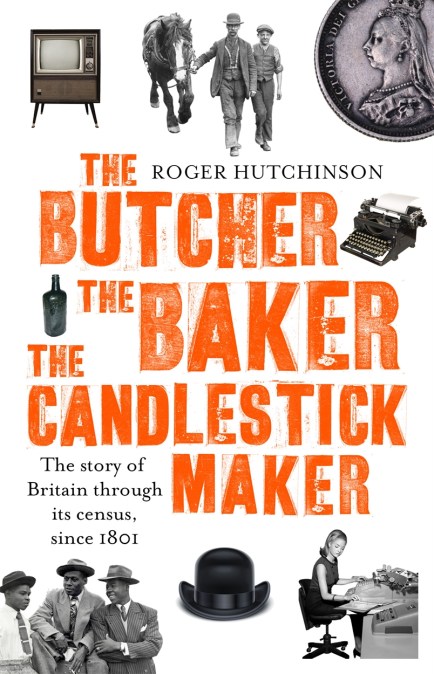At the beginning of each decade for 200 years the national census has presented a self-portrait of the British Isles.
The census has surveyed Britain from the Napoleonic wars to the age of the internet, through the agricultural and industrial revolutions, possession of the biggest empire on earth and the devastation of the 20th century’s two world wars.
In The Butcher, the Baker, the Candlestick Maker, Roger Hutchinson looks at every census between the first in 1801 and the latest in 2011. He uses this much-loved resource of family historians to paint a vivid picture of a society experiencing unprecedented changes.
Hutchinson explores the controversial creation of the British census. He follows its development from a head-count of the population conducted by clerks with quill pens, to a computerised survey which is designed to discover ‘the address, place of birth, religion, marital status, ability to speak English and self-perceived national identity of every twenty-seven-year-old Welsh-speaking Sikh metalworker living in Swansea’.
All human life is here, from prime ministers to peasants and paupers, from Irish rebels to English patriots, from the last native speakers of Cornish to the first professional footballers, from communities of prostitutes to individuals called ‘abecedarians’ who made a living from teaching the alphabet.
The Butcher, the Baker, the Candlestick Maker is as original and unique as those people and their islands on the cutting edge of Europe.
The census has surveyed Britain from the Napoleonic wars to the age of the internet, through the agricultural and industrial revolutions, possession of the biggest empire on earth and the devastation of the 20th century’s two world wars.
In The Butcher, the Baker, the Candlestick Maker, Roger Hutchinson looks at every census between the first in 1801 and the latest in 2011. He uses this much-loved resource of family historians to paint a vivid picture of a society experiencing unprecedented changes.
Hutchinson explores the controversial creation of the British census. He follows its development from a head-count of the population conducted by clerks with quill pens, to a computerised survey which is designed to discover ‘the address, place of birth, religion, marital status, ability to speak English and self-perceived national identity of every twenty-seven-year-old Welsh-speaking Sikh metalworker living in Swansea’.
All human life is here, from prime ministers to peasants and paupers, from Irish rebels to English patriots, from the last native speakers of Cornish to the first professional footballers, from communities of prostitutes to individuals called ‘abecedarians’ who made a living from teaching the alphabet.
The Butcher, the Baker, the Candlestick Maker is as original and unique as those people and their islands on the cutting edge of Europe.
Newsletter Signup
By clicking ‘Sign Up,’ I acknowledge that I have read and agree to Hachette Book Group’s Privacy Policy and Terms of Use
Reviews
Compelling . . . Hutchinson's book is a sobering reminder of how often we have ignored facts and listened to panic merchants
A quirky mix of broad-sweep history and fascinating nuggets of fact or biography . . . Hutchinson traces the real-life social changes behind Flora Thompson's Lark Rise novels, winkles out Britain's longest-lived citizens and its most prolific mother (Mary Jonas, who bore 33 children before dying aged 85 in 1899). But beneath these eye- catching incidental details lie deeper swells
Filled with interesting titbits, the book burrows into the official records to present a story that is sometimes uplifting and, at others, brutally stark
Outstanding . . . This is a quite splendid piece of research . . . The private evidence of futility is quiet
and compelling. Hard, bright anecdote and exhausted futility stand proud - memorially! The vainglory of war, but
also of ingenuity and courage ultimately lit up death, and are magnificently served in this calm and brilliant narrative
Absorbing . . . uplifting
Enthralling
This combination of personality and wider perspective, character study and big history, makes for a compelling read.
Roger Hutchinson combines the history of the census itself with what the census can tell us about British society over the past 200 years, in a remarkably entertaining way
Fascinating . . . what it tells us about who we are is simply priceless
so rich in personality and character that we are left wondering where those stories of marriage, migration and ambition went next. Hutchinson can weave a fine tale
Using the census records as the basis for a history of Britain is clearly an excellent idea for a book. Even so. Roger Hutchinson has carried it out particularly well . . . Happily, too. he manages to do this without the result ever becoming merely a blizzard of statistics. Admittedly, if you have ever wondered how many Brits made artificial flowers for a living in 1851. then here's where you'll find out. (Spoiler alert: it was 3.510.) Yet Hutchinson's sharp eye for the telling detail, his deft use of individual stories to illustrate the wider trends and his willingness to throw in any vaguely related facts that he (rightly) thinks we might find interesting make this a book to read with much pleasure
A warm-hearted book about a uniquely British triumph, a resource of a depth unrivalled anywhere in the world . . . His achievement, beneath the joy of the detail, teeming with Dickensian energy, is to suggest that the census is also a story of enterprise, vision, trust and reliability - a force of enlightenment. This is not a dense book. Rather it is light, wry and compassionate
